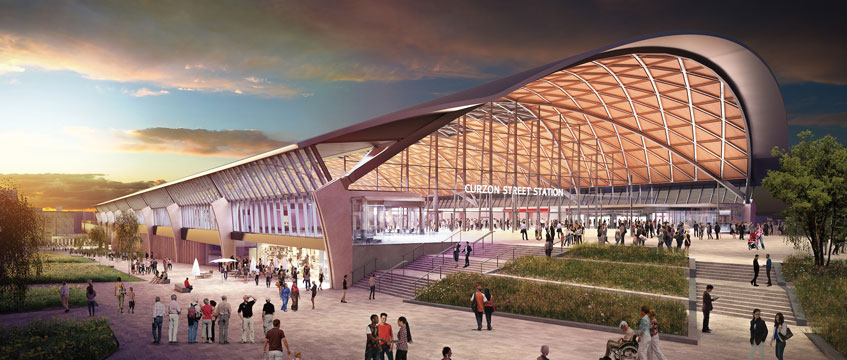HS2 review puts £1bn of Birmingham investment at risk
The government’s review of the High Speed 2 project has put £1bn of Birmingham’s planned infrastructure at risk, city officials say.
Projects now in doubt include the metro extension, public realm works and funds to unlock sites and support businesses.
About £1.2bn of investment is planned across Birmingham’s enterprise zone – a government-designated area that offers tax breaks and government support, and in which the local authority keeps any uplift in business rates to reinvest. The bulk of that expected investment is attributed to the extension of the zone to include the area around the Curzon Street HS2 station.
The government’s review of the High Speed 2 project has put £1bn of Birmingham’s planned infrastructure at risk, city officials say.
Projects now in doubt include the metro extension, public realm works and funds to unlock sites and support businesses.
About £1.2bn of investment is planned across Birmingham’s enterprise zone – a government-designated area that offers tax breaks and government support, and in which the local authority keeps any uplift in business rates to reinvest. The bulk of that expected investment is attributed to the extension of the zone to include the area around the Curzon Street HS2 station.
But this has been thrown into uncertainty following prime minister Boris Johnson’s decision to launch an independent review of HS2, chaired by former HS2 chair Doug Oakervee, which could see the £55.6bn rail project scrapped.
Neil Rami, chief executive of the West Midlands Growth Company, said: “It’s not just about stopping a rail track, it’s about stopping one of the most significant periods of regeneration and development in the West Midlands that we’ve seen for a generation.”
It’s not just about stopping a rail track, it’s about stopping one of the most significant periods of development that we’ve seen for a generation
– Neil Rami, West Midlands Growth Company
Enterprise zone extension
Richard Cowell, assistant director for development at Birmingham City Council, led the council’s work on the extension of the enterprise zone to take advantage of the uplift in business rates as a result of HS2. The city’s enterprise zone is now the country’s largest.
Cowell said: “The scale and level of growth, particularly around the Curzon area, is predicated on HS2. The potential of HS2 has taken our plans from around £300m up to £1.2bn. [The review] would certainly call that into question.”
He added: “There is a direct link there and this is the sort of evidence we will be providing to government as part of the independent review panel.”
The current proposed allocation includes £183m towards the metro extension to east Birmingham and Solihull; a provisional allocation of £150m towards the Smithfield regeneration; £82.5m of public realm enhancement in Digbeth; £60m towards enhancing the HS2 Curzon Street station public realm; £257m of broader investment in the Curzon area; and £20m towards the HS2 interchange.
“When we did the enterprise zone extension and committed a further £600m of investment through the Curzon investment plan to infrastructure, and a further £186m to extend the metro, that was all predicated on HS2 arriving,” Cowell said.
“If you take HS2 away, we are not going to be in a position to have that level of local infrastructure investment, which is funded through the enterprise zone.”
Rami said investment around Curzon Street and the UK Central Hub development in Solihull would be most at risk if HS2 is scrapped. “Companies have already invested and moved into the regions on the back of this transport infrastructure commitment,” he said. “It’s not just about HS2, it’s the wider secondary transport connections, particularly the metro system.”
Solihull’s UK Central Hub
Development around Solihull’s UK Central Hub is managed by the Urban Growth Company, a special purpose vehicle. The company has estimated that some £1.6bn of infrastructure investment has been lined up for the area. This includes developments around HS2, the metro and highways upgrades. Highways England has planned £282m of works at junction 6 on the M42, which was fast-tracked to prepare for HS2.
Jonathan Bretherton, managing director at the Urban Growth Company, said: “The plans for the UK Central Hub in Solihull are well-progressed and phased around the anticipated arrival of HS2.”
He said work was already under way on the redevelopment of Birmingham International Station, while Birmingham airport and the NEC events venue progress their masterplans with the expectation of HS2 arriving in 2026.
Bretherton said: “All of this work will continue whilst we work with the Oakervee review team. Our plan is still to create Europe’s best-connected destination for business, leisure and living, with HS2 as the catalyst for the broader investment and development.”
HS2 has attracted several businesses that have consolidated their operations at hubs in the West Midlands, such as Interserve at Birmingham Business Park and WSP at the Mailbox in Birmingham city centre. Rami said it is difficult to put a figure on the investment attached to HS2, pointing to the uptick in supply chain businesses linked to the construction, as well as the growth of education and skills, as Birmingham becomes a global centre for rail and engineering expertise. That, he added, makes the rail project even more crucial.
“To even countenance stopping this programme you have to look at what the secondary and tertiary impact is going to be,” he said. “They are impacts for a generation, because we are well on the road based on the commitment that the government made a few years ago.”
To send feedback, e-mail emma.rosser@egi.co.uk or tweet @EmmaARosser or @estatesgazette











